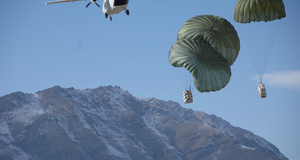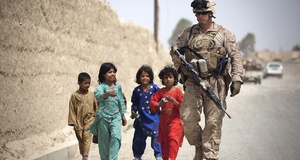Private Security Contractors in Afghanistan as Third-Party Propagators: Categorizing the Participation of Private Security Companies
By
2012, Vol. 4 No. 08 | pg. 1/3 | »
IN THIS ARTICLE
KEYWORDS
A public good is defined as a product or service that is both non-rival and non-excludable, meaning that one cannot withhold it from another without precluding all others from benefitting from it as well.1 Examples of such products have come to be typified by air (for breathing), public access television, and national defense. In spite of the public nature of these services, the third good in the series—national defense—has become increasingly privatized in recent years, as state actors find themselves looking for alternatives to heighten their military strength.2 In the face of troop shortages that are said to hamper the Pentagon’s ability to “meet its responsibilities around the world,”3 private security companies (PSCs)4—legal entities that supply governments, non-governmental organizations, and industry with private soldiers5—have been recruited extensively to supplement the work performed by the American military. While their employment has been historically limited to non-confrontational tasks such as laundry services and reconstruction efforts, the Department of Defense is for the first time relying upon these for-profit mercenaries to provide security during combat or stability operations.6 This has been the case regarding American intervention in Afghanistan and Iraq, especially since September 11, 2001. Private security companies have been particularly active in Afghanistan, operating in missions well beyond the scope of their contracts and resulting in fierce criticisms of their use in hot conflicts.7 Despite high levels of controversy with respect to the use of PSCs, more than 27,000 contracted personnel continue to serve in both Afghanistan and Iraq; 18,919 of these mercenaries serve exclusively in Afghanistan, a number thrice the size of the contingent present in the country in June 2009.8 Indeed, the overall number of private security contractors employed by the United States in Afghanistan is likely to rise further as it maintains military operations in the country.9 In spite of the growing importance of the role private security companies play as third-parties in international conflicts, there is nevertheless a severe deficiency in the academic literature that categorizes their participation. A closer examination of private security companies in Afghanistan reveals that these mercenaries represent a new category of third-party intervention: a term that we can refer to as third-party propagators; a successful intervention for these mercenaries entails the instigation of a conflict, not its resolution, as this would imply a loss of profits for these companies. Thus, the purpose of this paper is to evaluate the current literature surrounding the role of third-parties in international conflicts and to demonstrate how private security companies do not fit within any previously established categorization governing their behavior. Then, by scrutinizing the use of private military contractors in Afghanistan, the paper will conclude that modern-day private security firms, in the search for greater profits, have adopted a new role in international conflict as third-party instigators.Conventional Third-Party InterventionsIntermediaries are often defined as “third parties who intercede for the purpose of influencing or facilitating the settlement of a dispute but who do not impose a solution.”10 The literature further distinguishes third-parties according to the types of actors that carry out the intervention in the context of international conflict.11 Such categories include small and large states, international organizations, and myriad transnational actors. The goal of these interveners is not to alter the balance of power between the disputants in an international conflict, nor is it to impose solutions on the rival parties.12 Instead, they are meant to encourage the conflicting parties to reach a solution to which they might not have otherwise agreed.13 Nevertheless, each intervener possesses its own motivations for getting involved in international conflicts,14 and these incentives for intermediation serve to distinguish each actor from one another. To that end, this section will explain the historical role that these actors have played in the United States-Afghanistan conflict, while also highlighting how the functions of third-party private security companies are not adequately encompassed by these classifications. Small and Large StatesAlthough multiple third-party interveners now exist, small and large states have historically played a pivotal role in the mediation of interstate conflict.15 Such has been the experience of the American-led war effort in Afghanistan as well. In the immediate aftermath of the September 11, 2001 terrorist attacks, the same level of state involvement as third-parties continued. Rallying its resources in order to confront global terrorism,16 the United States enlisted the help of several smaller states as it attempted to bring charges to those responsible for the perpetration of the assault. More concretely, Pakistan, the United Arab Emirates, and Saudi Arabia—the only three nations that recognized the Taliban as Afghanistan’s government17—all attempted to broker an agreement between the Taliban and the United States ex-ante with the ultimate goal of achieving Osama bin Laden’s capitulation. 18,19 An agreement was never reached, which resulted in both Saudi Arabia and the United Arab Emirates severing ties with the Taliban regime.20 A NATO-led coalition of small- and large-state forces soon entered Afghanistan in order to topple the Taliban and al-Qaeda.21 The failure of the ex-ante mediation efforts thus caused war to break out in Afghanistan. Despite the inability of the three states to reach an agreement with the Taliban, the efforts of Pakistan, the United Arab Emirates, and Saudi Arabia are indicative of the mediatory roles that states have played in their capacity as third-parties to international disputes.22 As smaller, less powerful states with relatively little international involvement when compared to European allies of the United States, these three nations represented the quintessential negotiators in a conflict of this magnitude.23 Their recognition of the Taliban as a legitimate government, their geographic proximity to Afghanistan, and a shared religion posited the three negotiators as aligned with Afghanistan and more trustworthy for the Taliban regime. As has been seen, however, these mediation efforts proved to be unsuccessful, largely because small-state intervention is thought to be better suited for resolving conflicts of power inequality.24 Great power involvement during these early bargaining stages would have been equally ineffective, as their allegiance would have been viewed as aligned with the United States. Regardless, the initial mediation efforts, coupled with the involvement of coalition forces, demonstrate the evolution of the intentions of the third-party interventions in Afghanistan:25 Neutral parties were first enlisted in order to initiate mediatory talks. Since an agreement could not be reached, military intervention was undertaken by the United States and its coalition forces in order to implement a solution favorable to the superpower.26 Conventional theory dictates that a neutral third-party will be the next to intervene in order to facilitate negotiations between the disputing sides.27 As the conflict rages on, however, such has not been the case and, as will be demonstrated later, the involvement of private security companies in Afghanistan has often precluded the attainment of enough security and stability in the country to allow such negotiations to occur.28 International OrganizationsThird-party interventions encompass more than states interceding in the affairs of two disputing parties; international organizations also represent significant, third-party players with roles in easing international conflict.29 Defined as those bodies that identify themselves as international or intergovernmental whose members are from and represent the interests of more than one country,30 quotidian examples of international organizations include the United Nations, the European Union, the International Committee of the Red Cross, and the World Trade Organization. Although their services are varied, these groups, in general, perform two important functions:31 First, they often serve as the neutral third-party while managing interstate disputes and conflicts. Second, international organizations perform humanitarian work that is meant to aid in the recovery and reconstruction of a nation ex-post.32 Since the United States invaded Afghanistan without approval from the United Nations Security Council, this section will exclusively center on the latter of these two services as they relate to the conflict in Afghanistan. As the initial invasion of coalition forces into Afghanistan wound down, international organizations were seen as the backbone of the nation’s recovery efforts.33 This type of humanitarian intervention has been described as another instance of third-party intervention in international conflict.34 With up to an estimated $15 billion required for a decade’s worth of reconstruction and recovery efforts, the World Bank and the United Nations spearheaded an international fundraising effort in order to facilitate Afghanistan’s economic development.35 The extent to which these funds actually aid in the reconstruction of Afghanistan is largely dependent upon the success of these international organizations, which have already assisted in tasks as diverse as the establishment of refugee camps, health care, primary education, and infrastructure projects.36 Despite these strides toward success—and, admittedly, quite a bit remains to be done—private military contractors threaten to unravel the progress made thus far. As reports mount about for-profit mercenaries shooting a handcuffed Afghan, locals being abused by security contractors, and committing myriad other acts of violence that alienate Afghans, these PMCs are undermining the legitimacy of both the United States and the local government, hampering American efforts in the region.37 Transnational ActorsDistinct from state actors and international organizations, a transnational actor is one whose activities “transcend state boundaries and penetrate the decision-making of individuals and governments.” 38 The Vatican is often referred to as the unitary transnational organization for having played a mediatory role in diverse conflicts worldwide (such as its intervention in the Beagle Channel Dispute between Chile and Argentina during the 1980s),39 but other organizations that cross state boundaries and are independent of a government’s foreign policy are also included.40 Conventional transnational actors differ especially from state actors since their power is not based on military or economic resources, but on the ability to influence of a party’s moral legitimacy, exposure to the media, or access to information.41 Transnational actors in Afghanistan, however, have been anything but conventional. Indeed, insurgents in the country have adopted an innovative role as a transnational group, attacking allied forces in Afghanistan but retreating to Pakistan for protection and “technical and operational assistance from [other] transnational extremists there.”42 In this way, insurgents have sought to forge allegiances with those sympathetic to their cause, bringing in third-parties to support their struggle against the United States and its allies while simultaneously hampering any progress toward regional stability.43 Insurgents are not the only atypical examples of transnational actors at work in Afghanistan. Private security companies have evolved into a new role as “transnational security companies” that are not subject to stringent guidelines set for mercenaries in Article 1 of the International Convention of 1989.44 To further complicate the matter, once these firms have signed contracts with the United States government regarding security operations in Afghanistan, they proceed to subcontract with other multinational companies that select and train citizens of developing nations with military or police backgrounds to work.45 All of this has created soldiers-for-hire with no real stake in the conflict at-hand, but who are influenced by a corporate structure that benefits from the propagation of conflict since it increases the companies’ profits. While the discussion of the transnational nature of private security companies undertaken here serves as an initial categorization of their role as third-party actors, it is but a preliminary classification. Indeed, these firms serve as transnational bodies whose goals diverge from the “neutral mediator” image that literature has conventionally defined for transnational actors. 46 By contrast, the work conducted by PSCs is anything but neutral. As will be seen in the next section, profit motives have given private military companies an incentive to further propagate conflict by alienating civilians and instigating further conflict, all to the benefit of these firms’ profits.Continued on Next Page » Suggested Reading from Inquiries Journal
Inquiries Journal provides undergraduate and graduate students around the world a platform for the wide dissemination of academic work over a range of core disciplines. Representing the work of students from hundreds of institutions around the globe, Inquiries Journal's large database of academic articles is completely free. Learn more | Blog | Submit Latest in International Affairs |


















